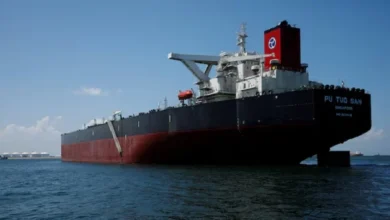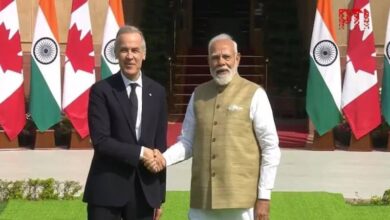HANOI/BANGKOK: Vietnam’s government said on Thursday it would set up a task force and other Southeast Asian nations said they plan to seek talks with Washington as they reel from being hit with some of US President Donald Trump’s heftiest tariffs.
Countries such as Vietnam and Thailand are heavy exporters to the US, having benefited as Chinese and international manufacturers shifted production to their economies to avoid levies on China that Trump imposed during his first term.
Six of the nine Southeast Asian countries listed by Trump were slapped with much bigger-than-expected tariffs of between 32% and 49%. By comparison, the level for the European Union was 20%.

So far, none of the Southeast Asian nations have spoken of retaliatory tariffs.
Vietnam, where companies like Apple, Nike and Samsung Electronics have large manufacturing operations, was hit with 46% levies and appears particularly exposed. Its exports to the United States were worth $142 billion last year, nearly 30% of its gross domestic product.
Vietnamese Prime Minister Pham Minh Chinh ordered up a task force to address the situation after an urgent cabinet meeting early on Thursday, state media said. He noted the country’s 8% growth target for this year remained unchanged.
“Vietnam’s export-driven growth model has been highly successful, attracting multinational companies … However, a 46% US tariff would directly challenge this model,” said Leif Schneider, head of international law firm Luther in Vietnam.
Vietnam has already made multiple concessions to Washington to avoid tariffs, and is likely to offer more in the coming days.
“I expect negotiations to continue on ways to reduce or mitigate the impact of any new tariffs,” said Adam Sitkoff, executive director of the American Chamber of Commerce in Hanoi.
Thai Prime Minister Paetongtarn Shinawatra said she hopes to bring down the 37% rate imposed on Thailand – far greater than the 11% it had expected.
“We have to negotiate and get into details,” she said. “We can’t let it get to where we miss our GDP target.”
Thai economic growth has lagged regional peers, growing at 2.5% last year, held back by soaring household debt. It is hoping for 3% growth this year.
Commerce Minister Pichai Naripthaphan said his government was prepared for negotiations and had high hopes they would go well, citing Thailand’s good relations with the US.
Malaysia, which was dealt a rate of 24%, announced it would not seek retaliatory tariffs and it said the trade ministry would be actively engaging with US authorities “to seek solutions that will uphold the spirit of free and fair trade.”
Cambodia is facing tariffs of 49% that will hurt its garment and footwear industries and crushing hopes that it could attract investment relocating from other countries in the region.
It is a “very, very serious situation for the economy,” said a Cambodia-based investment consultant who declined to be identified.
There is “nothing that Cambodia can offer as a negotiating tool, and will be at the back of a very long queue,” he added.
WORLD CRITICISES TRUMP
US President Trump has been criticised the world over for imposing tariffs.
Germany
The German Automotive Industry Association said the tariffs would “only create losers” and urged the EU to act “with necessary force, while continuing to signal its willingness to negotiate”. The German chemical industry, which counts the United States as its largest export market, urged the EU to “keep a cool head”, stressing “an escalation would only worsen the damage”.
Japan
Trade minister Yoji Muto said the 24pc tariffs on Japanese exports to the United States were “extremely regrettable, and I have again strongly urged (Washington) not to apply them to Japan”. Japan’s chief cabinet secretary Yoshimasa Hayashi told reporters the tariffs may contravene World Trade Organisation rules and the pair’s trade treaty.
India
Ajay Sahai, chief executive of the Federation of Indian Export Organisations told AFP the tariffs will “hurt demand” for its exports. “The tariffs slapped on India are definitely both high and higher than expected,” he said. But he said competitor nations like China and Vietnam had been hit harder, which opened up space for India to gain a market share.
UK
The UK will “remain calm, and committed” to sealing a trade deal with the United States which could help “mitigate” a 10pc tariff imposed on British exports to the United States, business minister Jonathan Reynolds said. However, “we have a range of tools at our disposal and we will not hesitate to act”, he added.
France
President Emmanuel Macron will meet representatives of French sectors “impacted by the tariff measures”, his office said.
Italy
Italian Prime Minister Giorgia Meloni criticised the new US tariffs on imports from the EU and urged a deal, warning a trade war would “inevitably weaken the West”. “The introduction by the US of tariffs towards the EU is a measure that I consider wrong and that does not suit either party,” she said.
Canada
Prime Minister Mark Carney warned the tariffs will “fundamentally change the global trading system”. “We are going to fight these tariffs with countermeasures. We are going to protect our workers,” he said.
Brazil
Brazil’s Congress approved a so-called “Economic Reciprocity Law” allowing the executive to respond to the 10pc tariffs on exports from Latin America’s biggest economy, which is the second-largest exporter of steel to the United States after Canada.
South Korea
“
A global tariff war has become a reality,” said acting president Han Duck-soo following Trump’s 25pc tariffs on imports from South Korea. Han convened an emergency task force and vowed to mobilise “all government resources” to overcome the “trade crisis”, urging ministers to minimise the damage through aggressive negotiations with Washington.
Australia
Prime Minister Anthony Albanese said the new tariffs were “not the act of a friend” and would hurt the close allies’ relationship. “These tariffs are not unexpected, but let me be clear: they are totally unwarranted,” he said.
Switzerland
After Switzerland was hit with 31pc tariffs, President Karin Keller-Sutter said the government would quickly decide on the next steps. “The country’s long-term economic interests are the priority. Respect for international law and free trade are fundamental,” she said.
Poland
Friendship means partnership. Partnership means really and truly reciprocal tariffs,” said Prime Minister Donald Tusk.
Taiwan
The Taiwanese government found the 32pc levy “highly unreasonable and deeply regretted it” said cabinet spokeswoman Michelle Lee. She said Taiwan would “initiate serious negotiations with the United States”.











